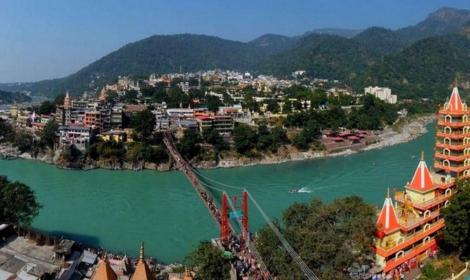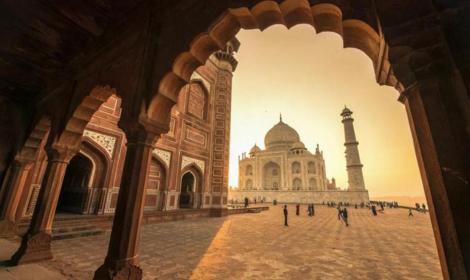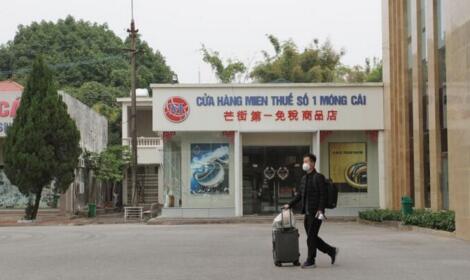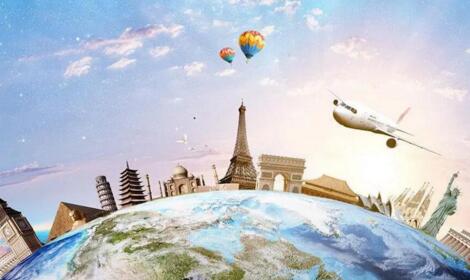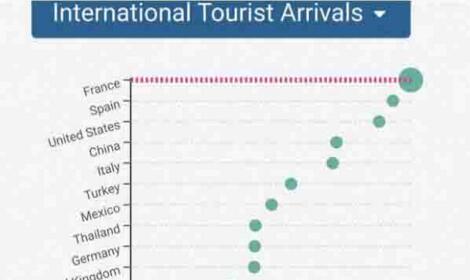旅游和游览有什么区别?
正文翻译
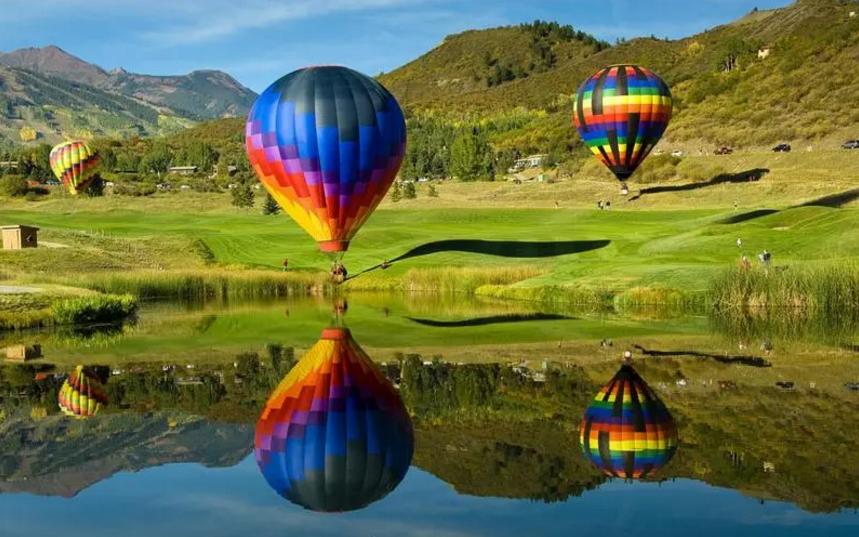
What is the difference between travelling and visiting?
旅游和游览有什么区别?

What is the difference between travelling and visiting?
旅游和游览有什么区别?
评论翻译
Daanish Ram Randhawa
What is the difference between a traveller and a tourist?
There are two main types of people who travel: travelers and tourists.
While neither is inherently bad or good, they possess very different characteristics that ultimately give them completely different experiences while venturing out into the world.
Here are some of the differentiating factors between the two types:
TOURIST PREFERS LEISURE; TRAVELER IS AN EXPLORER
Tourists are the ones who usually plan their tour whenever they got ample time and budget. They may call it a vacation or a holiday. For these categories of people traveling is done just for leisure and is a good short term break, they may lose the essence of what traveling is.
Traveler, on the other hand, is ready for the trip throughout the year. Taking leave may not be an issue. They can even take an expedition at any weekend. They set up a traveling goal in advance to get the real feel of their journey.
旅行者和观光客之间有什么区别?
旅行的人主要有两类:旅行者和游客。
虽然本质上没有好坏之分,但他们拥有非常不同的特征,最终在冒险进入世界时赋予他们完全不同的体验。
以下是两种类型之间的一些区别因素:
游客更喜欢休闲;旅行者是个探险家
只要有充足的时间和预算,游客通常会计划他们的旅行。他们可以称之为度假或过节。对于这类人来说,旅行只是为了休闲,是一次很好的短期休息,他们可能会失去旅行的本质。
另一方面,旅行者已经为全年的旅行做好了准备。休假可能不是问题。他们甚至可以在任何周末进行探险。他们提前设定了一个旅行目标,以获得旅行的真实感受。
A TOURIST STICKS OUT; A TRAVELER BLENDS IN
Selfie sticks, clogging up the sidewalk while staring at a map, socks with sandals... we’ve all seen this type of tourist stick out like a sore thumb. Tourists tend to draw attention to themselves with certain types of socially abnormal behaviors.
A traveler does their best to blend in with the locals. They look like they know where they are going (even if they don’t), they dress the part, and they make attempts to adhere to the social norms of where they are.
A TOURIST EATS COMFORT FOOD; A TRAVELER TRIES OUT THE LOCAL CUISINES
A tourist will only stick to foods that they are familiar with, which sometimes includes popular food chains.
A traveler knows that food is the lix to any culture. They are willing to step out of their comfort zone to try out local dishes to taste the country’s culture.
A TOURIST ONLY SIGHTSEES; A TRAVELER CONVERSES WITH LOCALS
A tourist stays within their comfort zone and only sticks with seeing the main, popular sights. They don’t make an effort to go out and meet people except those who they are traveling with.
A traveler makes an effort to meet people from all over. They try to talk with locals, find out the best (secret) things the city has to offer or discover unique stories that you can’t find in travel books. Travelers know that locals are the best resource to use when exploring somewhere new.
游客引人注目;旅行者融入其中
自拍杆,一边盯着地图一边堵在人行道上,袜子配凉鞋……我们都见过这类非常惹眼的游客。游客往往会用某些不正常的社会行为来吸引人们的注意。
旅行者尽最大努力与当地人打成一片。他们看起来知道自己要去哪里(即使他们不知道),穿着得体,并试图遵守所在地的社会规范。
游客吃舒适的食物;旅行者品尝当地的美食
游客只会选择他们熟悉的食物,其中有时包括受欢迎的连锁店的食物。
一个旅行者知道食物是连接任何文化的纽带。他们愿意走出自己的舒适区,尝试当地的菜肴,领略这个国家的文化。
游客只参观景点;一个旅行者与当地人交谈
游客呆在自己的舒适区内,只坚持看主要的热门景点。除了和他们一起旅行的人之外,他们不会努力出去与别人交流的。
旅行者努力与来自世界各地的人见面。他们试图与当地人交谈,了解这座城市能提供的最好的(秘密)东西,或者发现你在旅游书中找不到的独特故事。旅行者知道,在探索新的地方时,当地人是最好的资源。
TOURISTS DRESS FOR COMFORT; TRAVELERS DRESS FOR STYLE AND COMFORT
Tourists normally only pack clothes that they will be “comfortable” when traveling. Not only can this sometimes be unfashionable, but also run the risk of not being respectful to a country’s fashion norms (be it religious, cultural, etc.).
Travelers are a bit smarter when packing and know that style and comfort CAN go hand in hand. They make sure to bring clothes that are functional and fashionable, and also include any items that adhere to cultural norms.
TOURISTS STICK TO THEIR NATIVE TONGUE; TRAVELERS MAKE AN ATTEMPT TO LEARN THE LOCAL LANGUAGE
Tourists will only speak their native tongue and make very little (if any at all) effort to learn any of the local languages.
Travelers attempt to know at least a few keywords or phrases to use when traveling abroad. They know that learning how to say simple things like “please,” “thank you,” and “hello” make much more of a difference when traveling in a country that speaks a different language.
TOURISTS RELY ON MAPS; TRAVELERS TRUST THEIR INSTINCTS
Tourists rely heavily on their maps to tell them how to get from popular sight to popular sight. They can sometimes miss out on the adventure that is exploring.
Travelers trust their instinctive nature to tell them where to go and what to explore. This isn’t to say that they don’t use Google Maps here and there, but they aren’t afraid of getting lost and having an adventure. To them, getting lost means seeing beautiful things you might have never seen before.
“Please be a traveler, not a tourist. Try new things, meet new people, and look beyond what’s right in front of you. Those are the keys to understanding this amazing world we live in.”
游客穿着舒适;旅行者的着装既时尚又舒适
游客通常只打包旅行时“舒适”的衣服。这不仅有时会不合时宜,而且有可能不尊重一个国家的时尚规范(无论是宗教、文化等)。
旅行者在打包时会更聪明一点,他们知道时尚和舒适可以齐头并进。他们确保带上实用时尚的衣服,还包括任何符合文化规范的物品。
游客坚持他们的母语;旅行者试图学习当地语言。
游客只会说他们的母语,很少(如果有的话)努力学习任何当地语言。
旅行者试图知道至少几个关键词或短语,以便在出国旅行时使用。他们知道,在一个说不同语言的国家旅行时,学习如何说“请”、“谢谢”和“你好”等简单的话会产生更大的影响。
游客依赖地图;旅行者相信自己的直觉
游客们在很大程度上依赖于他们的地图来告诉他们如何从一个热门景点到另一个热门景区。他们有时会错过正在探索的冒险。
旅行者相信他们的本能会告诉他们该去哪里,该探索什么。这并不是说他们不在这里或那里使用谷歌地图,但他们不怕迷路和冒险。对他们来说,迷路意味着看到你可能从未见过的美丽事物。
“请做一个旅行者,而不要做游客。尝试新事物,结识新朋友,不要只看眼前的事物。这些是理解我们生活的这个神奇世界的关键。”
Quelqu'un
What is the difference between a traveller and a tourist?
These questions and the answers always make me raise a brow, especially since there are generally a judgement that is made upon each of these categories: “tourist” is so bad, but “traveller” is great!
I read a few definitions both given here or elsewhere and they always talk about how a traveller is free, learn the language, learn the customs, is an adventurer, etc. Tourists, on the other hand, crawl from a touristic site to another one, expect everyone to speak their language, sleep in a comfortable bed (how dare they!), etc.
Here is a thing: looking at these definitions, I’m always BOTH. And I’m sure everyone is.
I always end up with my huge map in my hand (I still use printed maps), trying to find the way and asking people what is the way. I don’t care if I don’t look like a local: I AM NOT ONE.
Also, let’s take an example. I spent three days in Bruges (Belgium). The language spoken there is mainly Flemish. So I learned:
“Hallo” (hello)
“Dank u” (thank you)
I also learned “sorry” and “I don’t speak Flemish” (but I’ve forgotten how to say it now). That’s pretty cute, but the truth is I ended up speaking English or French all the time because 4 words-ish isn’t enough to speak a language. I mean… no offense, but I won’t learn Flemish because I was there for 3 days.
旅行者和游客之间有什么区别?
这些问题和答案总是让我皱起眉头,特别是因为人们通常对每一个类别都做出了这样的判断:“游客”太糟糕了,但“旅行者”很棒!
我在这里或其他地方读到了一些定义,他们总是说旅行者是如何自由的,学习语言,学习习俗,是冒险家,等等。另一方面,游客从一个景点爬到另一个景点,期望每个人都说他们说的语言,睡在舒适的床上(他们怎么敢!),等等。
有一件事:看看这些定义,我总是两者都有,我相信每个人都是如此。
我总是手里拿着巨大的地图(我仍然使用打印的地图),试图找到路,并向人们询问路是什么。我不在乎自己是否看起来不像本地人:我不是本地人。
此外,让我们举一个例子。我在布鲁日(比利时)呆了三天。那里主要说佛兰芒语,所以我学会了:
“Hallo”(你好)
“Dank u”(谢谢)
我还学会了“对不起”和“我不会说佛兰芒语”(但我现在已经忘了怎么说了)。这很可爱,但事实是,我最终一直说英语或法语,因为会四个单词不足以让我说一门语言。我的意思是…无意冒犯好,我不会去学佛兰芒语,因为我在那里待三天而已。
Also, of course I’ll visit the main touristic attractions. The Eiffel tower? Check. The Manneken-Pis? Check. I have a friend who didn’t want to visit these places when she travelled because they were “so touristic”. they’re usually popular for a reason. Most of them were great (okay, the Manneken-Pis wasn’t haha).
I also read about how going to Mc Donald’s is touristic. But… I like going to Mc Donald’s to see the differences in the menu since Mc Donald’s adapts it to the cultures. To me, it is a cultural experience actually. ;)
I do all these things, but I always end up trying the local cuisine too, speaking with locals, going to shows, sport events, theater, etc. So my travels weren’t less interesting nonetheless. I still lived an adventure, I still got in touch with the locals, I still got lost, I still admired the beauty… even though I took selfies!
So what is the difference between a tourist and a traveller? To me, there are none. Each one get to experiment his/her trip the way he/she wants and is pleased and no judgement should be made (except if that person is an arsehole, of course). It doesn’t mean the trip was less of an adventure. It doesn’t mean you don’t get to discover the culture. You’re a traveller even though you sleep in a bed or get in a cab vs sleep in a tent and do hitchhiking.
the dictionnary makes no difference between both of these words. At least, not the ones I looked at. By definition, being in a new country is by default being a tourist. I’m a big fan of that definition.
To be fair, most answers here seemed very condescending to me. Some were also utterly confusing to me.
此外,我当然会参观主要的旅游景点。艾菲尔铁塔?看!撒尿小孩(Manneken-pis)雕像?看!我有一个朋友,她旅行时不想去这些地方,因为那里“太景点化了”。它们受欢迎通常是有原因的。他们中的大多数都很棒(好吧,撒尿小孩(Manneken-pis)雕像不算,哈哈)。
我还读到去麦当劳是一种旅游。但是,我喜欢去麦当劳看看菜单上的不同之处,因为麦当劳会根据不同的文化进行调整。对我来说,这实际上是一种文化体验。
我经历所有这些事情,但我最后也会尝试当地的美食,和当地人交谈,去看表演、体育赛事、剧院等。尽管如此,我的旅行还是很有趣。我仍然经历了冒险,我仍然与当地人接触,我仍然迷路,尽管我自拍了,但是我仍然欣赏这里的美丽!
那么,游客和旅行者之间有什么区别呢?对我来说,没有区别。每个人都能以他/她想要的方式体验他/她的旅行,高兴就好,不应该随意评定(当然,除非那个人是个混蛋)。这并不意味着这次旅行不是一次冒险。这并不意味着你不能探索其文化。即使你睡在床上或坐在出租车上,又或睡帐篷和搭便车,你都是旅行者。
字典上没有区分这两个词,至少我看过的那些没有。根据定义,去到一个新国家就默认是一名游客,我是这个定义的忠实粉丝。
公平地说,在我看来,这里的大多数答案都是充满着优越感,有些答案也让我完全困惑。
Ashish Godara
What is the difference between a traveller and a tourist?
Every time I open some travel page on Facebook I see people telling other people 'right' way of travelling. Discussions about how to be a traveller and not a tourist. This is one of the most ridiculous discussions I've heard of in a long time. We come across numerous articles and posts like ‘Travel in the true sense’, ‘Backpackers are the real travellers’, ‘Be a traveller, not a tourist’. I believe these all are nothing but an effort to categorise travel to justify your own inhibitions, limitations and interests. The topmost reason why one should leave their home and travel is to open one's mind. Travelling should broaden your horizon, help you leave behind all the restrictions of definitions, not trap you in another one.
To understand how this categorisation is actually not in line with the idea of travelling we have to dig deeper to the common perception of these categories. Who after all is a 'traveller', and not a 'tourist'? One who travels cheap, or the one who walks everywhere, or the one who stays with locals, or the one who hitchhikes? A friend of mine questioned recently why only backpackers are called true traveller these days. Everyone has their own life, own set of circumstances, own way of doing things. This is just another way of separating one quest from the others when the truth is that we all are searching for something, we just have different paths. And it would be so damn tiring if we were all on a same path.
旅行者和游客之间有什么区别?
每次我在脸书上打开一些旅游页面,我都会看到人们告诉别人“正确”的旅行方式。讨论如何成为一名旅行者而不是成为一名游客。这是我很长时间以来听到的最荒谬的讨论之一。我们看到了许多文章和帖子,如“真正意义上的旅行”、“背包客才是真正的旅行者”、“做一个旅行者,而不做游客”。我相信这些都是为了给旅行分类,以证明你自己的禁忌、限制和兴趣。一个人为什么应该离开家去旅行,最重要的原因是打开自己的心扉。旅行应该拓宽你的视野,帮助你摆脱所有定义的限制,而不是把你困在另一个定义中。
为了理解为什么这种分类实际上不符合旅行的理念,我们必须更深入地挖掘对这些类别的普遍看法。到底谁是“旅行者”,而不是“游客”?是搞廉价旅行的那人,还是到处步行的那个,还是和当地人住在一起的那个,还是搭便车的那个?我的一个朋友最近质疑为什么现在只有背包客才被称为真正的旅行者。每个人都有自己的生活,有自己所处的环境,有自己的做事方式。这只是另一种将一种探索方式与其他探索方式分开的方式,而事实是我们都在寻找某种东西,我们只是走不同的路径。如果我们都走在同一条路上,那就太累了。
You, who had the courage to leave your job and hit the road, are a Traveller. And you, who did not do it because of your own circumstances and travel only when job permits, are a traveller too.
You, who take public transport, sleep in dormitories or sometimes with locals for free, you are a traveller. And you, who travel in your comfortable car, book nice hotels on OYO, are a traveller too.
You, who talk to local people, drink and party with strangers, are a traveller. And you, who travel with your friends, take a lot of selfies, are a traveller too.
You, who have every long weekend planned for next one year, are a traveller. And you, who are standing on a bus stand figuring out which bus you should get on, are a traveller too.
We all are travelling, in one way or another.
Let's end this meaningless debate of who is a traveller and who is a tourist. Let's free ourselves from these definitions and be a new person every day. Let's just learn from each other and keep evolving
你有勇气辞职,踏上旅途,你是一个旅行者。而你,因为自己的情况而没有这样做,只有在工作允许的情况下才能旅行,也是一个旅行者。
你乘坐公共交通工具,住在宿舍里,有时和当地人免费住在一起,你是一个旅行者。而你,开着舒适的车旅行,在OYO上预订好酒店,你也是一个旅行者。
你和当地人交谈,和陌生人喝酒聚会,你是一个旅行者。和朋友一起旅行,经常自拍的你,也是一个旅行者。
你为下一年的每个长周末都做了计划,你是一个旅行者,而你站在公共汽车站,想知道该上哪辆公共汽车,也是一个旅行者。
让我们结束这场关于谁是旅行者,谁是游客的无意义辩论吧。让我们从这些定义中解脱出来,每天做一个全新的自己。让我们互相学习,不断进步。
Ben Loring
What is the difference between a traveller and a tourist?
One is an over privileged pretentious idiot and the other wants to lie around the pool reading a good book, possibly doing the odd tour sold by the hotel.
Get over yourselves!
I’ve never met a long term traveler that wasn’t on the run from something, but for those away for a few months:
I worked on the Gringo trail in Central America and all I can tell you is that I heard the same anecdotes about various spiritual epiphanies again and again. What seems such a unique and life changing experience for some is in reality just growing up and seeing how the world works.
That cute monkey that stole your food/camera/phone at Tikal and the kindly handsome young guy with amazing eyes and the soul of the forest that managed to get it back for you, before you spent a few days of passion together: yeah I heard about him a dozen times all from girls with the same misty-eyed look.
Digging the bus out of a landslide in Colombia: happens everyday. Repairing a bus with scrap iron from the side of the road: welcome to normality for most of the planet.
I’ve traveled all over Latin America and stayed the night in brothels with bullet holes in the walls patrolled by guys in Stetsons with revolvers on their belts, overrun with rats and cockroaches. I’ve camped on isolated islands for days with nothing more than a hammock. I’ve cut fresh trails through virgin Amazon rain forest having got there after days of travel by dugout canoe.
Just because I can't be arsed with all that now and just want 5 star hotels and air con all the way doesn’t give a bunch of Trustafarian Millenials the right to look down on me for doing so. I did all of the above with no mobile phone and no internet and nothing pre-booked!
旅行者和游客之间有什么区别?
一个是享有特权的自命不凡的白痴,另一个想躺在泳池边读一本好书,可能还会参加酒店提供的各种各样的旅行。
别自以为是了!
我从来没有遇到过一个长期旅行者,他不是在逃离什么,就是为了离开几个月。
我在中美洲的外国移民小道上工作过,我所能告诉你的就是,我一次又一次地听到同样的关于各种精神顿悟的轶事。对一些人来说,这似乎是一次独特的、改变人生的经历,但事实上,他们只是在成长,看看世界是如何运转的。
那只在蒂卡尔的可爱的猴子偷走了你的食物/相机/手机,而那个有惊人眼神和森林之魂的友善英俊年轻人设法为你拿回来,在你们共度激情几天之前,我听到过许多女孩用同样迷离的眼神讲述他的事。我听过十几次有关他的事迹了,都是从那些眼神泪眼模糊的女孩那里听说的。
在哥伦比亚的山体滑坡中挖掘巴士——每天都在发生。用路边的废铁修理公交车——对于大多数地球居民来说,这已经是常态了。
我走遍了拉丁美洲,在墙上有弹孔的妓院里过夜,一群穿着斯泰森制服、腰间挂着左轮手枪的家伙在巡逻,到处都是老鼠和蟑螂。我在孤岛上露营了好几天,除了吊床什么都没有。经历过好几天的独木舟旅行,我在原始的亚马逊雨林中开辟了新的小径。
仅仅因为我现在受不了那些事了,只想要五星级酒店和空调,这并不意味着一群信托嬉皮士和千禧一代就有权利看不起我这样做。我是在没有手机、没有网络、没有任何预定的情况下完成以上所有事情的!
Umang Chugh
The terms "travelling" and "visiting" are often used interchangeably, but they can have subtle differences depending on the context and perspective. Both involve going to different places, but they may imply distinct intentions, durations, and experiences. In this article, we will explore the nuances between travelling and visiting in detail, covering various aspects such as the purpose, duration, mindset, cultural immersion, and personal perspectives.
Purpose
The purpose of a trip can significantly impact whether it is considered travelling or visiting. Travelling often involves a broader purpose beyond just visiting a specific place. It may encompass a sense of exploration, adventure, or a desire to learn about different cultures, customs, and lifestyles. Travelling is often driven by a sense of curiosity and a willingness to step out of one's comfort zone to experience new things. It may also involve a deeper connection with the destination, such as volunteering, research, or professional development opportunities.
On the other hand, visiting often implies a more specific purpose, such as seeing family or friends, attending an event or occasion, or conducting business. Visiting is usually focused on a particular destination or person, with a clear agenda in mind. The duration of the trip may be shorter, and the itinerary may be more structured and planned.
Duration
The duration of a trip can also differentiate between travelling and visiting. Travelling is often associated with longer trips that span over weeks, months, or even years. It may involve multiple destinations, extended stays in different locations, and a more flexible itinerary. Travellers often have the freedom and flexibility to explore at their own pace, take detours, and stay in a place for an extended period to fully immerse themselves in the local culture and lifestyle.
On the other hand, visiting often implies shorter trips that typically last for a few days to a few weeks. The focus is usually on a specific destination or person, and the itinerary is often more fixed and planned, with limited time for spontaneous exploration or extended stays.
“旅行”和“游览”这两个术语经常互换使用,但根据上下文和视角的不同,它们可能会有细微的差异。两者都涉及到去不同的地方,但它们可能意味着不同的意图、持续时间和经历。在这篇文章中,我们将详细探讨旅行和游览之间的细微差别,涵盖目的、持续时间、心态、文化沉浸感和个人观点等各个方面。
意图
出行的目的可以显著影响它是被认为是旅行还是游览。旅行往往涉及到一个更广泛的目的,而不仅仅是去一个特定的地方。它可能包含一种探索、冒险的感觉,或者包含了解不同文化、习俗和生活方式的愿望。旅行往往是由好奇心和走出舒适区去体验新事物的意愿驱动的。它还可能涉及与目的地的更深层次的联系,例如志愿服务、研究或专业发展机会。
另一方面,游览往往意味着一个更具体的目的,例如看望家人或朋友,参加活动或场合,或开展业务。访问通常针对特定的目的地或个人,并有明确的日程安排。出行的持续时间可能更短,行程可能更有条理和计划。
持续时间
旅行的持续时间也可以区分旅行和游览。旅行通常与持续数周、数月甚至数年的长途旅行联系在一起。它可能涉及多个目的地、在不同地点的长期停留以及更灵活的行程。旅行者通常可以自由灵活地按照自己的节奏探索,绕道而行,在一个地方待上一段时间,让自己完全沉浸在当地的文化和生活方式中。
另一方面,游览往往意味着更短的行程,通常持续时间为几天到几周。重点通常放在特定的目的地或个人身上,行程通常更固定、更有计划,自发探索或长期停留的时间有限。
Mindset
The mindset and attitude of the traveller or visitor can also impact the experience. Travelling is often associated with a mindset of curiosity, openness, and adaptability. Travellers are often willing to embrace new experiences, take risks, and learn from different cultures and perspectives. They may seek out unique opportunities for personal growth, self-discovery, and expanding their horizons.
In contrast, visiting may involve a more familiar and comfortable mindset. Visitors often have a specific purpose or agenda in mind, and their focus may be on achieving their goals or spending time with loved ones. They may have a preconceived notion or expectation about the destination based on their familiarity or previous experiences.
Cultural Immersion
One significant difference between travelling and visiting is the level of cultural immersion. Travelling often involves a deeper immersion into the local culture, customs, and way of life. Travellers may interact with local communities, learn the language, try local cuisine, and participate in cultural activities. They may be more open to adapting to local customs and may seek to understand and respect the local culture.
Visiting, on the other hand, may involve a more limited level of cultural immersion. Visitors may have a specific purpose or agenda that may not allow for a deep exploration of the local culture. They may spend more time with familiar people or engage in activities that are familiar to them, and their exposure to the local culture may be limited to tourist attractions or popular tourist spots.
Personal Perspectives
The perception and personal perspectives of individuals can also influence whether a trip is considered travelling or visiting. Different people may have different definitions and interpretations of these terms based on their own experiences, mindset, and intentions.
心态
旅行者或游览的心态和态度也会影响体验。旅行通常与好奇心、开放性和适应性的心态联系在一起。旅行者通常愿意接受新的体验,承担风险,并从不同的文化和角度学习。他们可能会为个人成长、自我发现和拓展视野寻找独特的机会。
相比之下,游览可能需要一种更熟悉、更舒适的心态。游览者通常心中有一个特定的目的或议程,他们的重点可能是实现自己的目标或与亲人共度时光。根据他们的熟悉程度或以前的经历,他们可能对目的地有先入为主的概念或期望。
文化沉浸感
旅行和游览之间的一个显著区别是文化沉浸度。旅行往往需要更深入地融入当地的文化、习俗和生活方式。旅行者可以与当地社区互动,学习语言,品尝当地美食,并参加文化活动。他们可能更愿意适应当地习俗,并可能寻求理解和尊重当地文化。
另一方面,游览可能涉及更有限程度的文化沉浸。游客可能有一个特定的目的或议程,可能不允许深入探索当地文化。他们可能会花更多的时间与熟悉的人在一起,或参加他们熟悉的活动,他们对当地文化的接触可能仅限于旅游景点或热门旅游景点。
个人观点
个人的感知和个人观点也会影响出行是否被视为旅行或游览。不同的人可能会根据自己的经历、心态和意图对这些术语有不同的定义和解释。
What is the difference between a traveller and a tourist?
There are two main types of people who travel: travelers and tourists.
While neither is inherently bad or good, they possess very different characteristics that ultimately give them completely different experiences while venturing out into the world.
Here are some of the differentiating factors between the two types:
TOURIST PREFERS LEISURE; TRAVELER IS AN EXPLORER
Tourists are the ones who usually plan their tour whenever they got ample time and budget. They may call it a vacation or a holiday. For these categories of people traveling is done just for leisure and is a good short term break, they may lose the essence of what traveling is.
Traveler, on the other hand, is ready for the trip throughout the year. Taking leave may not be an issue. They can even take an expedition at any weekend. They set up a traveling goal in advance to get the real feel of their journey.
旅行者和观光客之间有什么区别?
旅行的人主要有两类:旅行者和游客。
虽然本质上没有好坏之分,但他们拥有非常不同的特征,最终在冒险进入世界时赋予他们完全不同的体验。
以下是两种类型之间的一些区别因素:
游客更喜欢休闲;旅行者是个探险家
只要有充足的时间和预算,游客通常会计划他们的旅行。他们可以称之为度假或过节。对于这类人来说,旅行只是为了休闲,是一次很好的短期休息,他们可能会失去旅行的本质。
另一方面,旅行者已经为全年的旅行做好了准备。休假可能不是问题。他们甚至可以在任何周末进行探险。他们提前设定了一个旅行目标,以获得旅行的真实感受。
A TOURIST STICKS OUT; A TRAVELER BLENDS IN
Selfie sticks, clogging up the sidewalk while staring at a map, socks with sandals... we’ve all seen this type of tourist stick out like a sore thumb. Tourists tend to draw attention to themselves with certain types of socially abnormal behaviors.
A traveler does their best to blend in with the locals. They look like they know where they are going (even if they don’t), they dress the part, and they make attempts to adhere to the social norms of where they are.
A TOURIST EATS COMFORT FOOD; A TRAVELER TRIES OUT THE LOCAL CUISINES
A tourist will only stick to foods that they are familiar with, which sometimes includes popular food chains.
A traveler knows that food is the lix to any culture. They are willing to step out of their comfort zone to try out local dishes to taste the country’s culture.
A TOURIST ONLY SIGHTSEES; A TRAVELER CONVERSES WITH LOCALS
A tourist stays within their comfort zone and only sticks with seeing the main, popular sights. They don’t make an effort to go out and meet people except those who they are traveling with.
A traveler makes an effort to meet people from all over. They try to talk with locals, find out the best (secret) things the city has to offer or discover unique stories that you can’t find in travel books. Travelers know that locals are the best resource to use when exploring somewhere new.
游客引人注目;旅行者融入其中
自拍杆,一边盯着地图一边堵在人行道上,袜子配凉鞋……我们都见过这类非常惹眼的游客。游客往往会用某些不正常的社会行为来吸引人们的注意。
旅行者尽最大努力与当地人打成一片。他们看起来知道自己要去哪里(即使他们不知道),穿着得体,并试图遵守所在地的社会规范。
游客吃舒适的食物;旅行者品尝当地的美食
游客只会选择他们熟悉的食物,其中有时包括受欢迎的连锁店的食物。
一个旅行者知道食物是连接任何文化的纽带。他们愿意走出自己的舒适区,尝试当地的菜肴,领略这个国家的文化。
游客只参观景点;一个旅行者与当地人交谈
游客呆在自己的舒适区内,只坚持看主要的热门景点。除了和他们一起旅行的人之外,他们不会努力出去与别人交流的。
旅行者努力与来自世界各地的人见面。他们试图与当地人交谈,了解这座城市能提供的最好的(秘密)东西,或者发现你在旅游书中找不到的独特故事。旅行者知道,在探索新的地方时,当地人是最好的资源。
TOURISTS DRESS FOR COMFORT; TRAVELERS DRESS FOR STYLE AND COMFORT
Tourists normally only pack clothes that they will be “comfortable” when traveling. Not only can this sometimes be unfashionable, but also run the risk of not being respectful to a country’s fashion norms (be it religious, cultural, etc.).
Travelers are a bit smarter when packing and know that style and comfort CAN go hand in hand. They make sure to bring clothes that are functional and fashionable, and also include any items that adhere to cultural norms.
TOURISTS STICK TO THEIR NATIVE TONGUE; TRAVELERS MAKE AN ATTEMPT TO LEARN THE LOCAL LANGUAGE
Tourists will only speak their native tongue and make very little (if any at all) effort to learn any of the local languages.
Travelers attempt to know at least a few keywords or phrases to use when traveling abroad. They know that learning how to say simple things like “please,” “thank you,” and “hello” make much more of a difference when traveling in a country that speaks a different language.
TOURISTS RELY ON MAPS; TRAVELERS TRUST THEIR INSTINCTS
Tourists rely heavily on their maps to tell them how to get from popular sight to popular sight. They can sometimes miss out on the adventure that is exploring.
Travelers trust their instinctive nature to tell them where to go and what to explore. This isn’t to say that they don’t use Google Maps here and there, but they aren’t afraid of getting lost and having an adventure. To them, getting lost means seeing beautiful things you might have never seen before.
“Please be a traveler, not a tourist. Try new things, meet new people, and look beyond what’s right in front of you. Those are the keys to understanding this amazing world we live in.”
游客穿着舒适;旅行者的着装既时尚又舒适
游客通常只打包旅行时“舒适”的衣服。这不仅有时会不合时宜,而且有可能不尊重一个国家的时尚规范(无论是宗教、文化等)。
旅行者在打包时会更聪明一点,他们知道时尚和舒适可以齐头并进。他们确保带上实用时尚的衣服,还包括任何符合文化规范的物品。
游客坚持他们的母语;旅行者试图学习当地语言。
游客只会说他们的母语,很少(如果有的话)努力学习任何当地语言。
旅行者试图知道至少几个关键词或短语,以便在出国旅行时使用。他们知道,在一个说不同语言的国家旅行时,学习如何说“请”、“谢谢”和“你好”等简单的话会产生更大的影响。
游客依赖地图;旅行者相信自己的直觉
游客们在很大程度上依赖于他们的地图来告诉他们如何从一个热门景点到另一个热门景区。他们有时会错过正在探索的冒险。
旅行者相信他们的本能会告诉他们该去哪里,该探索什么。这并不是说他们不在这里或那里使用谷歌地图,但他们不怕迷路和冒险。对他们来说,迷路意味着看到你可能从未见过的美丽事物。
“请做一个旅行者,而不要做游客。尝试新事物,结识新朋友,不要只看眼前的事物。这些是理解我们生活的这个神奇世界的关键。”
Quelqu'un
What is the difference between a traveller and a tourist?
These questions and the answers always make me raise a brow, especially since there are generally a judgement that is made upon each of these categories: “tourist” is so bad, but “traveller” is great!
I read a few definitions both given here or elsewhere and they always talk about how a traveller is free, learn the language, learn the customs, is an adventurer, etc. Tourists, on the other hand, crawl from a touristic site to another one, expect everyone to speak their language, sleep in a comfortable bed (how dare they!), etc.
Here is a thing: looking at these definitions, I’m always BOTH. And I’m sure everyone is.
I always end up with my huge map in my hand (I still use printed maps), trying to find the way and asking people what is the way. I don’t care if I don’t look like a local: I AM NOT ONE.
Also, let’s take an example. I spent three days in Bruges (Belgium). The language spoken there is mainly Flemish. So I learned:
“Hallo” (hello)
“Dank u” (thank you)
I also learned “sorry” and “I don’t speak Flemish” (but I’ve forgotten how to say it now). That’s pretty cute, but the truth is I ended up speaking English or French all the time because 4 words-ish isn’t enough to speak a language. I mean… no offense, but I won’t learn Flemish because I was there for 3 days.
旅行者和游客之间有什么区别?
这些问题和答案总是让我皱起眉头,特别是因为人们通常对每一个类别都做出了这样的判断:“游客”太糟糕了,但“旅行者”很棒!
我在这里或其他地方读到了一些定义,他们总是说旅行者是如何自由的,学习语言,学习习俗,是冒险家,等等。另一方面,游客从一个景点爬到另一个景点,期望每个人都说他们说的语言,睡在舒适的床上(他们怎么敢!),等等。
有一件事:看看这些定义,我总是两者都有,我相信每个人都是如此。
我总是手里拿着巨大的地图(我仍然使用打印的地图),试图找到路,并向人们询问路是什么。我不在乎自己是否看起来不像本地人:我不是本地人。
此外,让我们举一个例子。我在布鲁日(比利时)呆了三天。那里主要说佛兰芒语,所以我学会了:
“Hallo”(你好)
“Dank u”(谢谢)
我还学会了“对不起”和“我不会说佛兰芒语”(但我现在已经忘了怎么说了)。这很可爱,但事实是,我最终一直说英语或法语,因为会四个单词不足以让我说一门语言。我的意思是…无意冒犯好,我不会去学佛兰芒语,因为我在那里待三天而已。
Also, of course I’ll visit the main touristic attractions. The Eiffel tower? Check. The Manneken-Pis? Check. I have a friend who didn’t want to visit these places when she travelled because they were “so touristic”. they’re usually popular for a reason. Most of them were great (okay, the Manneken-Pis wasn’t haha).
I also read about how going to Mc Donald’s is touristic. But… I like going to Mc Donald’s to see the differences in the menu since Mc Donald’s adapts it to the cultures. To me, it is a cultural experience actually. ;)
I do all these things, but I always end up trying the local cuisine too, speaking with locals, going to shows, sport events, theater, etc. So my travels weren’t less interesting nonetheless. I still lived an adventure, I still got in touch with the locals, I still got lost, I still admired the beauty… even though I took selfies!
So what is the difference between a tourist and a traveller? To me, there are none. Each one get to experiment his/her trip the way he/she wants and is pleased and no judgement should be made (except if that person is an arsehole, of course). It doesn’t mean the trip was less of an adventure. It doesn’t mean you don’t get to discover the culture. You’re a traveller even though you sleep in a bed or get in a cab vs sleep in a tent and do hitchhiking.
the dictionnary makes no difference between both of these words. At least, not the ones I looked at. By definition, being in a new country is by default being a tourist. I’m a big fan of that definition.
To be fair, most answers here seemed very condescending to me. Some were also utterly confusing to me.
此外,我当然会参观主要的旅游景点。艾菲尔铁塔?看!撒尿小孩(Manneken-pis)雕像?看!我有一个朋友,她旅行时不想去这些地方,因为那里“太景点化了”。它们受欢迎通常是有原因的。他们中的大多数都很棒(好吧,撒尿小孩(Manneken-pis)雕像不算,哈哈)。
我还读到去麦当劳是一种旅游。但是,我喜欢去麦当劳看看菜单上的不同之处,因为麦当劳会根据不同的文化进行调整。对我来说,这实际上是一种文化体验。
我经历所有这些事情,但我最后也会尝试当地的美食,和当地人交谈,去看表演、体育赛事、剧院等。尽管如此,我的旅行还是很有趣。我仍然经历了冒险,我仍然与当地人接触,我仍然迷路,尽管我自拍了,但是我仍然欣赏这里的美丽!
那么,游客和旅行者之间有什么区别呢?对我来说,没有区别。每个人都能以他/她想要的方式体验他/她的旅行,高兴就好,不应该随意评定(当然,除非那个人是个混蛋)。这并不意味着这次旅行不是一次冒险。这并不意味着你不能探索其文化。即使你睡在床上或坐在出租车上,又或睡帐篷和搭便车,你都是旅行者。
字典上没有区分这两个词,至少我看过的那些没有。根据定义,去到一个新国家就默认是一名游客,我是这个定义的忠实粉丝。
公平地说,在我看来,这里的大多数答案都是充满着优越感,有些答案也让我完全困惑。
Ashish Godara
What is the difference between a traveller and a tourist?
Every time I open some travel page on Facebook I see people telling other people 'right' way of travelling. Discussions about how to be a traveller and not a tourist. This is one of the most ridiculous discussions I've heard of in a long time. We come across numerous articles and posts like ‘Travel in the true sense’, ‘Backpackers are the real travellers’, ‘Be a traveller, not a tourist’. I believe these all are nothing but an effort to categorise travel to justify your own inhibitions, limitations and interests. The topmost reason why one should leave their home and travel is to open one's mind. Travelling should broaden your horizon, help you leave behind all the restrictions of definitions, not trap you in another one.
To understand how this categorisation is actually not in line with the idea of travelling we have to dig deeper to the common perception of these categories. Who after all is a 'traveller', and not a 'tourist'? One who travels cheap, or the one who walks everywhere, or the one who stays with locals, or the one who hitchhikes? A friend of mine questioned recently why only backpackers are called true traveller these days. Everyone has their own life, own set of circumstances, own way of doing things. This is just another way of separating one quest from the others when the truth is that we all are searching for something, we just have different paths. And it would be so damn tiring if we were all on a same path.
旅行者和游客之间有什么区别?
每次我在脸书上打开一些旅游页面,我都会看到人们告诉别人“正确”的旅行方式。讨论如何成为一名旅行者而不是成为一名游客。这是我很长时间以来听到的最荒谬的讨论之一。我们看到了许多文章和帖子,如“真正意义上的旅行”、“背包客才是真正的旅行者”、“做一个旅行者,而不做游客”。我相信这些都是为了给旅行分类,以证明你自己的禁忌、限制和兴趣。一个人为什么应该离开家去旅行,最重要的原因是打开自己的心扉。旅行应该拓宽你的视野,帮助你摆脱所有定义的限制,而不是把你困在另一个定义中。
为了理解为什么这种分类实际上不符合旅行的理念,我们必须更深入地挖掘对这些类别的普遍看法。到底谁是“旅行者”,而不是“游客”?是搞廉价旅行的那人,还是到处步行的那个,还是和当地人住在一起的那个,还是搭便车的那个?我的一个朋友最近质疑为什么现在只有背包客才被称为真正的旅行者。每个人都有自己的生活,有自己所处的环境,有自己的做事方式。这只是另一种将一种探索方式与其他探索方式分开的方式,而事实是我们都在寻找某种东西,我们只是走不同的路径。如果我们都走在同一条路上,那就太累了。
You, who had the courage to leave your job and hit the road, are a Traveller. And you, who did not do it because of your own circumstances and travel only when job permits, are a traveller too.
You, who take public transport, sleep in dormitories or sometimes with locals for free, you are a traveller. And you, who travel in your comfortable car, book nice hotels on OYO, are a traveller too.
You, who talk to local people, drink and party with strangers, are a traveller. And you, who travel with your friends, take a lot of selfies, are a traveller too.
You, who have every long weekend planned for next one year, are a traveller. And you, who are standing on a bus stand figuring out which bus you should get on, are a traveller too.
We all are travelling, in one way or another.
Let's end this meaningless debate of who is a traveller and who is a tourist. Let's free ourselves from these definitions and be a new person every day. Let's just learn from each other and keep evolving
你有勇气辞职,踏上旅途,你是一个旅行者。而你,因为自己的情况而没有这样做,只有在工作允许的情况下才能旅行,也是一个旅行者。
你乘坐公共交通工具,住在宿舍里,有时和当地人免费住在一起,你是一个旅行者。而你,开着舒适的车旅行,在OYO上预订好酒店,你也是一个旅行者。
你和当地人交谈,和陌生人喝酒聚会,你是一个旅行者。和朋友一起旅行,经常自拍的你,也是一个旅行者。
你为下一年的每个长周末都做了计划,你是一个旅行者,而你站在公共汽车站,想知道该上哪辆公共汽车,也是一个旅行者。
让我们结束这场关于谁是旅行者,谁是游客的无意义辩论吧。让我们从这些定义中解脱出来,每天做一个全新的自己。让我们互相学习,不断进步。
Ben Loring
What is the difference between a traveller and a tourist?
One is an over privileged pretentious idiot and the other wants to lie around the pool reading a good book, possibly doing the odd tour sold by the hotel.
Get over yourselves!
I’ve never met a long term traveler that wasn’t on the run from something, but for those away for a few months:
I worked on the Gringo trail in Central America and all I can tell you is that I heard the same anecdotes about various spiritual epiphanies again and again. What seems such a unique and life changing experience for some is in reality just growing up and seeing how the world works.
That cute monkey that stole your food/camera/phone at Tikal and the kindly handsome young guy with amazing eyes and the soul of the forest that managed to get it back for you, before you spent a few days of passion together: yeah I heard about him a dozen times all from girls with the same misty-eyed look.
Digging the bus out of a landslide in Colombia: happens everyday. Repairing a bus with scrap iron from the side of the road: welcome to normality for most of the planet.
I’ve traveled all over Latin America and stayed the night in brothels with bullet holes in the walls patrolled by guys in Stetsons with revolvers on their belts, overrun with rats and cockroaches. I’ve camped on isolated islands for days with nothing more than a hammock. I’ve cut fresh trails through virgin Amazon rain forest having got there after days of travel by dugout canoe.
Just because I can't be arsed with all that now and just want 5 star hotels and air con all the way doesn’t give a bunch of Trustafarian Millenials the right to look down on me for doing so. I did all of the above with no mobile phone and no internet and nothing pre-booked!
旅行者和游客之间有什么区别?
一个是享有特权的自命不凡的白痴,另一个想躺在泳池边读一本好书,可能还会参加酒店提供的各种各样的旅行。
别自以为是了!
我从来没有遇到过一个长期旅行者,他不是在逃离什么,就是为了离开几个月。
我在中美洲的外国移民小道上工作过,我所能告诉你的就是,我一次又一次地听到同样的关于各种精神顿悟的轶事。对一些人来说,这似乎是一次独特的、改变人生的经历,但事实上,他们只是在成长,看看世界是如何运转的。
那只在蒂卡尔的可爱的猴子偷走了你的食物/相机/手机,而那个有惊人眼神和森林之魂的友善英俊年轻人设法为你拿回来,在你们共度激情几天之前,我听到过许多女孩用同样迷离的眼神讲述他的事。我听过十几次有关他的事迹了,都是从那些眼神泪眼模糊的女孩那里听说的。
在哥伦比亚的山体滑坡中挖掘巴士——每天都在发生。用路边的废铁修理公交车——对于大多数地球居民来说,这已经是常态了。
我走遍了拉丁美洲,在墙上有弹孔的妓院里过夜,一群穿着斯泰森制服、腰间挂着左轮手枪的家伙在巡逻,到处都是老鼠和蟑螂。我在孤岛上露营了好几天,除了吊床什么都没有。经历过好几天的独木舟旅行,我在原始的亚马逊雨林中开辟了新的小径。
仅仅因为我现在受不了那些事了,只想要五星级酒店和空调,这并不意味着一群信托嬉皮士和千禧一代就有权利看不起我这样做。我是在没有手机、没有网络、没有任何预定的情况下完成以上所有事情的!
Umang Chugh
The terms "travelling" and "visiting" are often used interchangeably, but they can have subtle differences depending on the context and perspective. Both involve going to different places, but they may imply distinct intentions, durations, and experiences. In this article, we will explore the nuances between travelling and visiting in detail, covering various aspects such as the purpose, duration, mindset, cultural immersion, and personal perspectives.
Purpose
The purpose of a trip can significantly impact whether it is considered travelling or visiting. Travelling often involves a broader purpose beyond just visiting a specific place. It may encompass a sense of exploration, adventure, or a desire to learn about different cultures, customs, and lifestyles. Travelling is often driven by a sense of curiosity and a willingness to step out of one's comfort zone to experience new things. It may also involve a deeper connection with the destination, such as volunteering, research, or professional development opportunities.
On the other hand, visiting often implies a more specific purpose, such as seeing family or friends, attending an event or occasion, or conducting business. Visiting is usually focused on a particular destination or person, with a clear agenda in mind. The duration of the trip may be shorter, and the itinerary may be more structured and planned.
Duration
The duration of a trip can also differentiate between travelling and visiting. Travelling is often associated with longer trips that span over weeks, months, or even years. It may involve multiple destinations, extended stays in different locations, and a more flexible itinerary. Travellers often have the freedom and flexibility to explore at their own pace, take detours, and stay in a place for an extended period to fully immerse themselves in the local culture and lifestyle.
On the other hand, visiting often implies shorter trips that typically last for a few days to a few weeks. The focus is usually on a specific destination or person, and the itinerary is often more fixed and planned, with limited time for spontaneous exploration or extended stays.
“旅行”和“游览”这两个术语经常互换使用,但根据上下文和视角的不同,它们可能会有细微的差异。两者都涉及到去不同的地方,但它们可能意味着不同的意图、持续时间和经历。在这篇文章中,我们将详细探讨旅行和游览之间的细微差别,涵盖目的、持续时间、心态、文化沉浸感和个人观点等各个方面。
意图
出行的目的可以显著影响它是被认为是旅行还是游览。旅行往往涉及到一个更广泛的目的,而不仅仅是去一个特定的地方。它可能包含一种探索、冒险的感觉,或者包含了解不同文化、习俗和生活方式的愿望。旅行往往是由好奇心和走出舒适区去体验新事物的意愿驱动的。它还可能涉及与目的地的更深层次的联系,例如志愿服务、研究或专业发展机会。
另一方面,游览往往意味着一个更具体的目的,例如看望家人或朋友,参加活动或场合,或开展业务。访问通常针对特定的目的地或个人,并有明确的日程安排。出行的持续时间可能更短,行程可能更有条理和计划。
持续时间
旅行的持续时间也可以区分旅行和游览。旅行通常与持续数周、数月甚至数年的长途旅行联系在一起。它可能涉及多个目的地、在不同地点的长期停留以及更灵活的行程。旅行者通常可以自由灵活地按照自己的节奏探索,绕道而行,在一个地方待上一段时间,让自己完全沉浸在当地的文化和生活方式中。
另一方面,游览往往意味着更短的行程,通常持续时间为几天到几周。重点通常放在特定的目的地或个人身上,行程通常更固定、更有计划,自发探索或长期停留的时间有限。
Mindset
The mindset and attitude of the traveller or visitor can also impact the experience. Travelling is often associated with a mindset of curiosity, openness, and adaptability. Travellers are often willing to embrace new experiences, take risks, and learn from different cultures and perspectives. They may seek out unique opportunities for personal growth, self-discovery, and expanding their horizons.
In contrast, visiting may involve a more familiar and comfortable mindset. Visitors often have a specific purpose or agenda in mind, and their focus may be on achieving their goals or spending time with loved ones. They may have a preconceived notion or expectation about the destination based on their familiarity or previous experiences.
Cultural Immersion
One significant difference between travelling and visiting is the level of cultural immersion. Travelling often involves a deeper immersion into the local culture, customs, and way of life. Travellers may interact with local communities, learn the language, try local cuisine, and participate in cultural activities. They may be more open to adapting to local customs and may seek to understand and respect the local culture.
Visiting, on the other hand, may involve a more limited level of cultural immersion. Visitors may have a specific purpose or agenda that may not allow for a deep exploration of the local culture. They may spend more time with familiar people or engage in activities that are familiar to them, and their exposure to the local culture may be limited to tourist attractions or popular tourist spots.
Personal Perspectives
The perception and personal perspectives of individuals can also influence whether a trip is considered travelling or visiting. Different people may have different definitions and interpretations of these terms based on their own experiences, mindset, and intentions.
心态
旅行者或游览的心态和态度也会影响体验。旅行通常与好奇心、开放性和适应性的心态联系在一起。旅行者通常愿意接受新的体验,承担风险,并从不同的文化和角度学习。他们可能会为个人成长、自我发现和拓展视野寻找独特的机会。
相比之下,游览可能需要一种更熟悉、更舒适的心态。游览者通常心中有一个特定的目的或议程,他们的重点可能是实现自己的目标或与亲人共度时光。根据他们的熟悉程度或以前的经历,他们可能对目的地有先入为主的概念或期望。
文化沉浸感
旅行和游览之间的一个显著区别是文化沉浸度。旅行往往需要更深入地融入当地的文化、习俗和生活方式。旅行者可以与当地社区互动,学习语言,品尝当地美食,并参加文化活动。他们可能更愿意适应当地习俗,并可能寻求理解和尊重当地文化。
另一方面,游览可能涉及更有限程度的文化沉浸。游客可能有一个特定的目的或议程,可能不允许深入探索当地文化。他们可能会花更多的时间与熟悉的人在一起,或参加他们熟悉的活动,他们对当地文化的接触可能仅限于旅游景点或热门旅游景点。
个人观点
个人的感知和个人观点也会影响出行是否被视为旅行或游览。不同的人可能会根据自己的经历、心态和意图对这些术语有不同的定义和解释。




